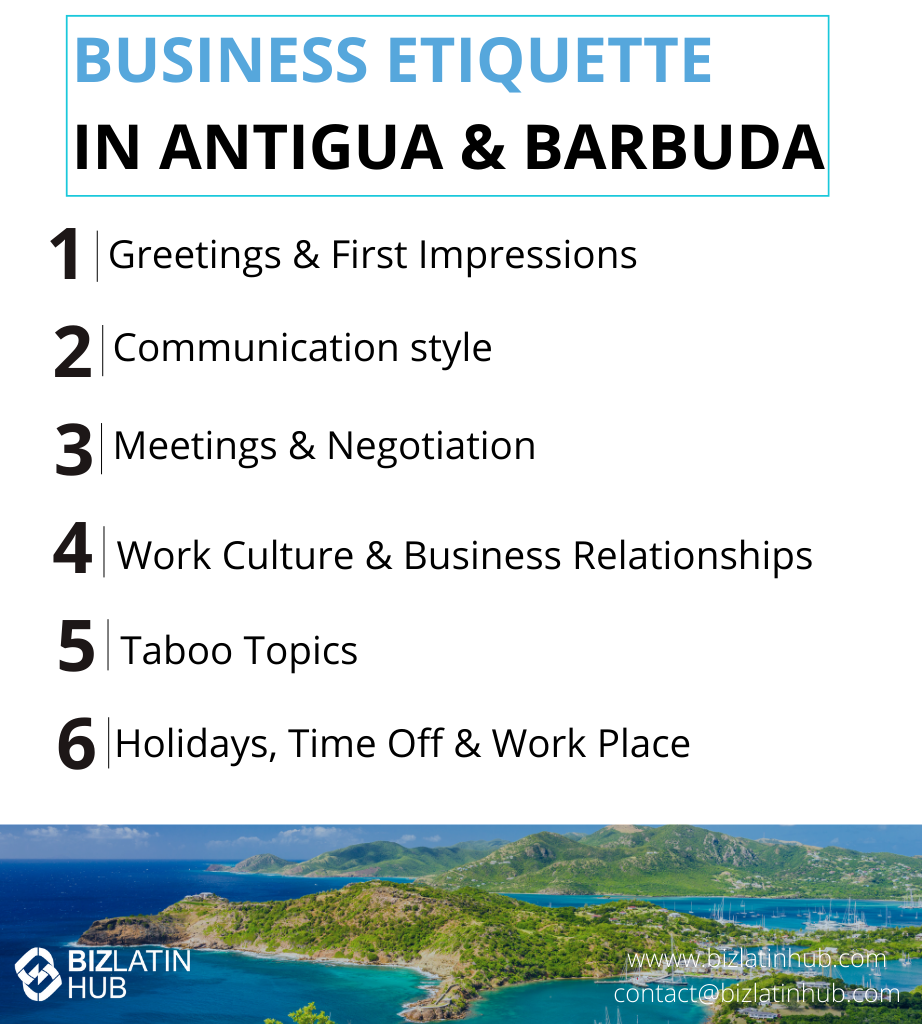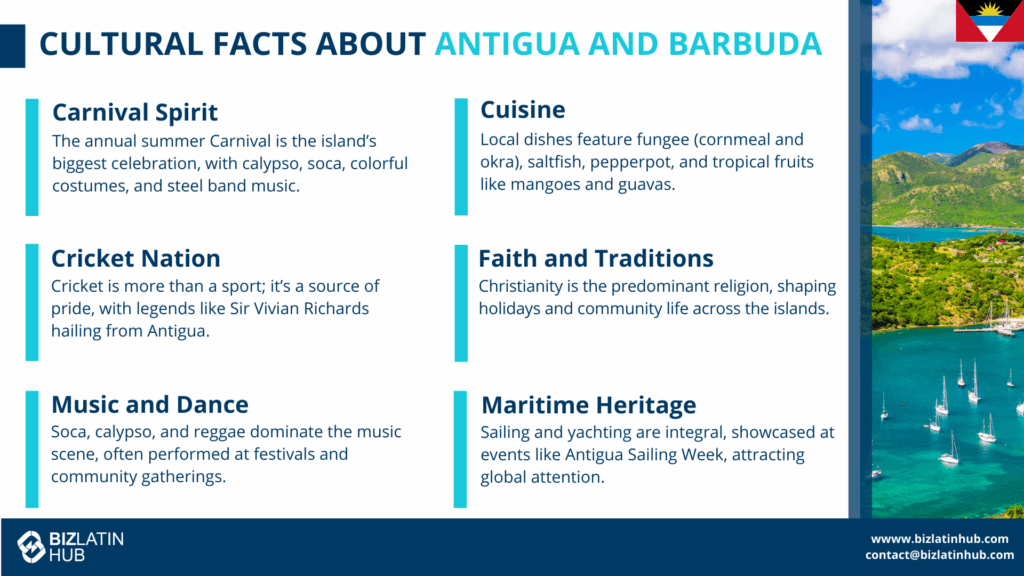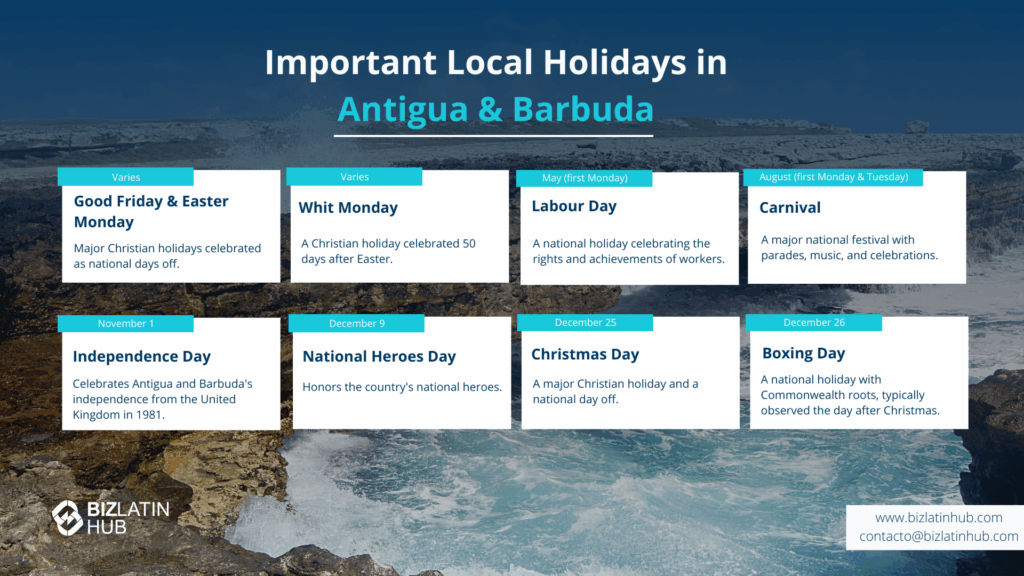Doing business or considering company formation in Antigua & Barbuda? The islands present a friendly, English‑speaking environment with strong Caribbean culture, British colonial heritage, and modern global connections. Understanding local norms, expectations, and etiquette will help you build strong relationships, avoid misunderstandings, and appear respectful and professional.
Key takeaways on business etiquette in Antigua and Barbuda
| How important is it to build relationships in Antigua and Barbuda? | Trust and relationship building is often more important than overly aggressive bargaining. Once trust is established, discussions may move more quickly. Expect some patience: negotiations may take longer than in very transactional business cultures. |
| Is punctuality important in Antigua and Barbuda? | Work‑life balance tends to be valued more than in extremely competitive business environments. The relaxed Caribbean lifestyle influences expectations of pace. |
| What negotiation style is best? | Business conversation often values harmony; direct criticism or “no” may be softened or phrased indirectly to avoid conflict. Expect some diplomacy in disagreement. |
| Stay respectful | Politics, race, religion can be delicate. If you don’t know someone well, avoid bringing up controversial issues. |
Greetings & First Impressions
- Politeness & Formality at First Meeting: In business settings, greetings tend to be polite and somewhat formal at first. Use “Good morning,” “Good afternoon,” “Mr./Ms. [Surname]” until invited to use first names. Taking time for small talk (weather, family, travel) is common before launching into business.
- Handshakes: A firm but not overly strong handshake, with eye contact, is standard. Men stand to greet women with handshake; if a woman offers her hand first, it’s fine.
- Dress Code: Dress conservatively and professionally for business meetings. Lightweight suits or jackets for men, dresses or business suits for women. Even though the climate is warm, avoid overly casual or resort‑style clothing (tank tops, flip flops) in formal settings.
Communication Style
- Indirect & Respectful: Business conversation often values harmony; direct criticism or “no” may be softened or phrased indirectly to avoid conflict. Expect some diplomacy in disagreement.
- Small Talk First: Before diving into contracts or proposals, it is customary to build rapport. Discussions about family, background, mutual contacts, or experiences may precede business. Trust matters.
- Non‑Verbal Communication: Tone of voice, body language, facial expressions are important. Maintaining eye contact (but not aggressively), showing respect via posture, nodding, smiling are valued.
- Written Communication: Formal when required (legal, government, contracts); emails may mix formal and informal depending on relationship. Proofread carefully; clarity and politeness go a long way.
Meetings & Negotiations
- Punctuality vs Flexibility: Being on time is appreciated in business contexts; arriving a few minutes early or exactly on time shows respect. However, allow for some flexibility—traffic, weather, or daily island rhythms may cause slight delays.
- Agenda & Decision Making: Sometimes agendas are flexible. Discussions may wander into personal topics or storytelling. Decision‑making tends to involve hierarchy: senior figures’ opinions carry weight. Present your case clearly, but also with humility and respect for senior stakeholders.
- Negotiations: Trust and relationship building is often more important than overly aggressive bargaining. Once trust is established, discussions may move more quickly. Expect some patience: negotiations may take longer than in very transactional business cultures.
Work Culture & Business Relationships

- Hierarchy & Authority: Respect for authority, elders, and business titles is common. Even in more modern or collaborative organizations, clear reporting lines are usually recognized.
- Teamwork & Group Harmony: Emphasis is placed on working cohesively, maintaining harmony, and avoiding public criticism. Feedback may be given privately rather than in front of large groups.
- Time & Deadlines: While business deadlines are taken seriously, there may be more flexibility compared to very fast‑paced business hubs. Allow buffer times when possible. Communicate in advance if delays or issues arise.
- Hospitality & Social Norms: Expect meetings or negotiations to include refreshments, possibly food. Accept offers of local hospitality graciously. Personal gestures (asking about family, showing interest in local life) help to build trust.
Taboo Topics & Things to Avoid
- Sensitive Subjects: Politics, race, religion can be delicate. If you don’t know someone well, avoid bringing up controversial issues.
- Being Overly Aggressive or Rushed: Aggressive sales tactics or pushing too hard too early can backfire. The local culture values respect, patience and relational trust.
- Dress & Appearance Flops: Being too casual in formal meetings can be viewed as disrespectful. Note the tropical climate, but aim for airy yet professional fabrics.
- Ignoring Local Holidays & Customs: Scheduling meetings over public holidays without checking can lead to issues. Also, being unaware of religious observances or national observances may be seen as a lack of respect.

Holidays, Time Off & Work Pace
- Antigua & Barbuda has several public holidays that affect business operations. Plan around these.
- Work‑life balance tends to be valued more than in extremely competitive business environments. The relaxed Caribbean lifestyle influences expectations of pace.
- In sectors like tourism or hospitality, peak seasons may require tougher schedules; flexibility is often expected during those times.

FAQs on business etiquette in Antigua and Barbuda
These are the most common queries we receive from our clients.
Dress professionally. Men typically wear lightweight suits or jackets with dress shirts; prefer breathable fabrics due to climate. Women wear conservative business attire — dresses, skirts or slacks with a blazer. Avoid overly casual clothing or beachwear in formal or corporate meetings.
A firm, friendly handshake, eye contact, and polite greeting (“Good morning/afternoon”). Use titles (Mr./Ms.) until invited to use first names. Small talk about weather, family, or local topics is normal before moving into business.
Business communications are formal initially. Written documents like proposals, contracts, etc. tend to use proper, somewhat formal language. Once relationships are established, communication can become more relaxed, but politeness is consistently appreciated.
Being punctual for meetings is expected and demonstrates respect. However, there is a generally more relaxed pace in day‑to‑day operations. Allow buffers, don’t expect everything to move at the speed of highly pressured business hubs. Communication matters: if delays happen, it’s better to let people know in advance.
Very important. Building trust, personal rapport, and understanding local culture are essential. Relationships often precede formal negotiations or contracts. Showing genuine interest in local people, customs, and hospitality can go a long way. Eventually, this may even lead to residency.
Biz Latin Hub can help you with business etiquette in Antigua and Barbuda
At Biz Latin Hub, our multilingual team of company formation specialists has extensive experience in supporting foreign executives when starting a business in Latin America. We offer a complete set of services for your business needs, such as legal, accounting, and recruitment support.
You can rely on us as your main contact for entering and doing business in any of the 18 markets in Latin America and the Caribbean where we operate.
Contact us now for personalized assistance or a free quote on company formation in Latin America.
Learn more about our team and expert authors.





